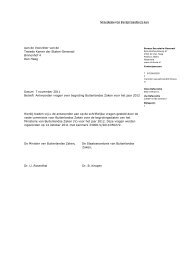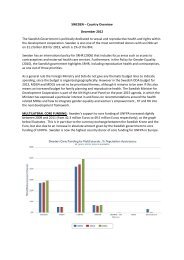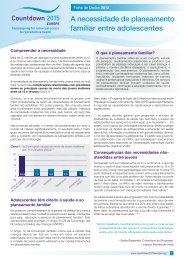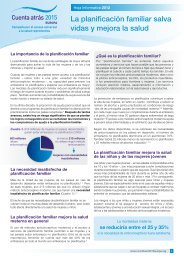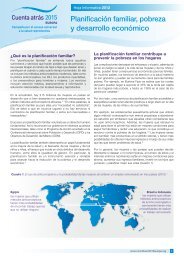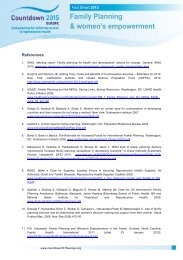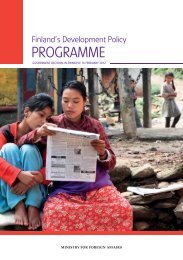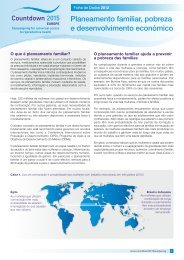The Unmet Need for Family Planning - Countdown 2015 Europe
The Unmet Need for Family Planning - Countdown 2015 Europe
The Unmet Need for Family Planning - Countdown 2015 Europe
You also want an ePaper? Increase the reach of your titles
YUMPU automatically turns print PDFs into web optimized ePapers that Google loves.
Q Why is a ‘mix’ of methods important? Don’t we already havethe pill and the condom? Isn’t that enough?A Different people need different methods. Sometimesthat’s because they experience side-effects in responseto a particular method (such as a pill or implant). Or ifa woman’s husband or family doesn’t want her usingcontraception, she needs a method she can use discreetly(such as going to a clinic <strong>for</strong> injectables once everythree months, instead of having to take a pill every day).Contraceptive needs also vary over a person’s lifecycle.For example, some women, especially older women, wanta permanent or long-acting method, to avoid pregnancyaltogether, and this is very different from a young woman whowants to have children in the near future.Q I understand that the largest generation of young peopleare coming of age and becoming sexually active. Can’tyoung people get contraceptives in the same places thatadults get them?A In some places, young people may be denied contraceptivesdue to social, cultural or religious restrictions. In other places,although there may not be specific legal or communityrestrictions on young people’s access to contraceptives,existing services may not be appropriate. For example,most existing family planning programmes are designed tomeet the needs of married women, rather than the specificneeds of young people; and such services may be locatedin places that are difficult or inconvenient <strong>for</strong> young peopleto get to, or at times when they cannot attend. Where familyplanning is fee-based, as it is in many countries, young peoplemay simply not have the money to pay <strong>for</strong> contraceptives.It is also important to note that in many parts of the world youngpeople may have limited accurate knowledge about sexual andreproductive health, including contraception. This underscoresthe need to ensure that every generation gets comprehensivesexuality education, which enables them to make in<strong>for</strong>medchoices about their sexual and reproductive lives.Q To slow climate change, shouldn’t we slow the growth ofpopulations in developing countries?A Climate change is mainly due to consumption and greenhousegas emissions in developed countries, but less-developedcountries are and will continue to be most affected byit (Bryant, Carver et al. 2009; Lancet/UCL 2009; UNDP2010). Indeed, many developing countries have identifiedrapid population growth as one of the things that hinderstheir abilities to adapt to climate change (Bryant, Carver etal. 2009). However, coercive ‘population control’ policies– like those seen in the 1960s and 1970s – were largelyineffective and violated the human rights of millions of people.of a comprehensive policy which also includes, <strong>for</strong> example,investments in food security, safe water supply, improvedbuildings, re<strong>for</strong>estation, and other strategies (Lancet/UCL 2009).Q <strong>Family</strong> planning is only one aspect of women’s rights.Shouldn’t we focus more generally on improving equality<strong>for</strong> women – <strong>for</strong> example, through micro-credit schemes oreducational programmes <strong>for</strong> girls?A A woman’s ability to control her fertility is vital to herfreedom and autonomy, and is a fundamental human right.In fact, one of the key indicators of women’s empowermentat the household level is the ability to make childbearingdecisions and use contraception (Grown, Gupta et al. 2003).Meeting women’s needs <strong>for</strong> contraception empowers thempersonally, socially, economically and politically (Center <strong>for</strong>Reproductive Rights/UNFPA 2010), while also supportingother ef<strong>for</strong>ts to promote women’s rights. For example, moderncontraceptive use by women and girls increases their accessto education, in part by reducing the number of girls <strong>for</strong>ced todrop out of school due to pregnancy (Barot 2008). In addition,women who use contraceptives are more likely to be activeand productive in the work<strong>for</strong>ce, which means they haveincreased earning power that allows them to improve their ownand their family’s economic security (FHI; WHO 2010).Q In a nutshell, what needs to be done?A Donors and governments need specific budget lines<strong>for</strong> reproductive health and family planning, or moretransparency in existing budget lines <strong>for</strong> ‘population’.This needs to be maintained with more political supportand policies that recognize how important familyplanning is to human and economic development.Policies and budget lines should focus on giving people accessto the full range of modern contraceptive methods, witheffective distribution, accompanied by accurate in<strong>for</strong>mation orcounselling on how to use them and potential side-effects.<strong>The</strong>se need to be available at low prices or <strong>for</strong> free, in locationswhere people can get them easily. Health system strengtheningef<strong>for</strong>ts should always include a family planning component.We also need evidence-based education programmes <strong>for</strong>adolescents and women about modern contraceptive methodsand the risks of pregnancy, and to educate men to promotepositive attitudes about contraception.On the other hand, voluntary, rights-based family planningprogrammes can help developing countries to achieve asustainable population and mitigate the effects of climate change(Lancet/UCL 2009). Voluntary family planning needs to be partwww.countdown<strong>2015</strong>europe.org25




